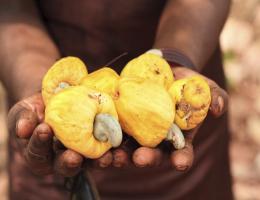A Discussion with ACA's Global Development Alliance Private Sector Partners
On April 26, 2013, the USAID officially awarded the African Cashew Alliance (ACA) with a Global Development Alliance (GDA) grant. Pegged as a market-based approach to meeting business and development objectives, the GDA grant to ACA is meant to result in $10M of additional income for rural communities, over a two-year time span. The African Cashew Alliance will be leveraging its public-private partnerships to meet these benchmarks.  " width=
" width=
Now in the second quarter of 2013, the first year of implementation, we are checking in with some private sector representatives to gather their thoughts on the Global Development Alliance grant and what it means for the African Cashew Alliance.
Arie Endendjik, ACA Advisory board member and Purchasing Director of Intersnack, and Partheeban Theodore, ACA Advisory board member and Vice President of Olam International, took the time to answer a few questions.
You are a private company and you are part of the ACA Advisory Board. Why do you choose to invest in The African Cashew Alliance?
Arie Endendjik: We are convinced that a strong industry body will bring a lot of benefits to the industry, the more while this industry is quite immature. We feel obliged to give support both in knowledge and finance hence our support to the ACA.
Partheeban Theodore: ACA has now developed into being a key leader in the promotion and development of African cashews and is respected locally, i.e. across Africa and increasingly internationally through the annual conference now being held and the work it undertakes in trade fares. Also the ACA is now recognized as the hub for information for the African cashew industry
USAID’s GDA model is a market-based approach for partnerships between the public and private sectors to jointly address business and development objectives. What are the technical resources you will provide to ACA?
Arie Endendjik: The Olam cashew managers that work across procurement, processing & marketing are actively engaging with ACA, this leads to a mutual exchange of technical skills. Olam’s facilities have often been the first port of call to many potential investors. Olam has also offered several training programs to the industry participants including exposure to bankers who would like to understand the nuances of processing and the related risks.
Partheeban Theodore: Food safety experts, project management and sustainability experts.
A main focus of the grant is development of the ACA Quality and Sustainability Seal. This innovative new program, the first of its kind in the world, will directly improve the competitiveness of the African cashew processing industry. Why are you interested in supporting it? How important are food safety and quality to your markets?
Arie Endendjik: Intersnack was one of the founding fathers and ‘thought leader’ on the ACA Seal. This motivated by the fact that retail requires BRC foodsafety certification in order to be able to supply; it’s hence imperative. Even though the Seal on it’s own does not represent a BRC certification, it addresses the important items and sets plants on the right path. This will guarantee we will be able to sell the product in Europe.
Partheeban Theodore: Olam has participated in the development of the seal to date and sees this as an important 3rd party endorsement of a sustainable supply chain, with a particular reference to food safety and labour practices. International consumers increasingly want to have surety and understanding of the products in the market place and a recognized seal will offer this.
In the future, how do you expect the industry to grow in Africa? How will this affect you as a main buyer or processor?
Arie Endendjik: We are putting our force behind growth of the industry in Africa by participating in SC linkage projects, like those of the ACi. More demand for cashews means more competition with other buyers for the good suppliers; we are positioning ourselves to be the ‘buyer of choice’ for sellers by showing long term partnership. The buy-in of ngo’s, like the program of USAID , is imperative for success as, as an individual company, we can’t possible all by ourselves.
Partheeban Theodore: We are putting our force behind growth of the industry in Africa by participating in SC linkage projects, like those of the ACi. More demand for cashews means more competition with other buyers for the good suppliers; we are positioning ourselves to be the ‘buyer of choice’ for sellers by showing long term partnership. The buy-in of ngo’s, like the program of USAID , is imperative for success as, as an individual company, we can’t possible all by ourselves.
The program is expected to result in additional income of $10 M for rural communities and create 3,200 jobs. How is the Corporate Social Responsibility aspect important for your company and your customers?
Arie Endendjik: This is very important and such aspects are also mentioned on our website. Still, we want to emphasize we are not in Africa for CSR reasons but because we are convinced this should be the core of our strategy; a better reason to cooperate with all stakeholders does not exist!
Partheeban Theodore: For Olam, farmer and community investments through our programmes are core to our business model. An example has been the development of the Olam Livelihood Charter which features some our cashew initiatives. Olam’s philosophy is to be a partner in developing ‘thriving communities’, enabling agriculture to continuously develop and improve and facilitating investments in health and education.


